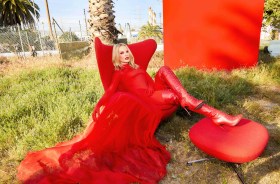Image: www.fringeworld.com.au
Citizens of the internet age will be at home at theatre maker Emma Hall’s Fringe show We May Have to Choose. The show is a list of 621 opinions and observations – some irreverent (new babies are ugly), some flippant, and some unsettling in their stark truth (poor people have a harder life than rich people) – that are rattled off deadpan with the disconnected continuity of a social media feed. There is no narrative arch, no climax, no story development, though there is an ending that reflects back on the whole piece and pulls much of it rudely into perspective. We May Have to Choose is a darkly funny piece of theatre that, by bombarding the audience with one woman’s opinions, makes them consider the implications of their own.
Hall wrote the show at a time when she was hanging out with comedians, and taking an interest in their processes, as well as the very different way they relate to an audience. As a result, the show is something of a hybrid. Hall is on her own up there, speaking directly to the audience, and many of the things she says are funny, or at least amusing. But overall the show is not a work of comedy; the underlying subject matter, which could be roughly interpreted as a comment on opinions and inaction in the context of a broken world, are serious. Cleverly, the amusing, simple and irrefutably true statements infect the more controversial ones, imbuing them with their own sort of truth. In the middle of the show, the audience are asked to agree or disagree with certain statements by a show of hands, which is quite a startling development. Suddenly, we are implicated.
We May Have to Choose is very starkly produced, with a simple set, no props, and a single, haunting soundtrack by SS. Sebastian. The lighting, by Amelia Lever-Davidson, is more complex, and though lovely, can prove distracting against such a sparse background. It provided a delineation required for tonal shifts in the piece, but when coupled with Hall’s rehearsed cues, these shifts came across as clunky.
Despite this, it’s a testament to the quality of the piece that it didn’t grow dull or repetitive in its simplicity, or with its lack of narrative arch. In fact, the piece was much stronger as a result of its restraint – the form itself is a simple one, anything extra would only clutter it. And though the main relationship binding the 621 statements is their membership within the same stream of consciousness, small points of repetition and reference bring them together into something you might call structure. Statements wash over the audience and vanish in the wake of the next, but reappear when referenced.
We May Have to Choose is clever social commentary without hyperbole. It’s a show that crisply avoids melodrama while making the audience suddenly aware of the self-important chatter in their own brains, and the conspicuous inaction that accompanies it.
Rating: 3.5 stars out of 5
We May Have to Choose
Written and performed by Emma Hall
The Shambles, Northbridge
22 – 26 January
Fringe World 2016
22 January – 21 February






